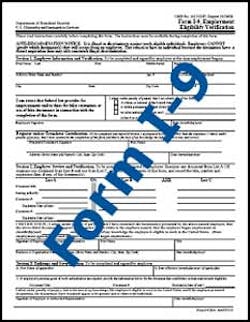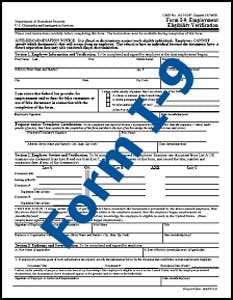Help! What is an I-9 Form? Find out for your dental business
An I-9 form is a document that all employers, no matter their number of employees, are required to have for each employee. While this requirement has been in place since 1986, we find dentists are still sorely lacking in the knowledge, or are failing to properly manage this area of employment compliance.
This should concern you because:
* In fiscal year 2007, Immigration and Customs Enforcement (ICE) conducted only 250 audits. In fiscal year 2012, ICE I-9 audits had risen to more than 3,000.
* From 2009 until 2012, fines for I-9 violations grew from $1 million to $13 million.
* The number of company owners, executives, and managers arrested during ICE investigations increased to 238.
All indications are that fiscal year 2013 will, in fact, be worse. So this is not the time to be slacking off in this particular area ofemployment compliance.
Why bother?
The Immigration Reform and Control Act of 1986 (IRCA) requires all employers to verify the identity and employment eligibility for all employees hired after November 1986. This is accomplished through the use of the I-9 form.
What needs to be done?
Section I is completed by the newly hired employee. Beyond basic information, this section asks the employee to indicate whether or not he or she is a citizen of the U.S. If not, the employee must state how it is that he or she is authorized to be in working in the U.S.
Section II is completed by the employer. In this section, the employer examines Section I and asks for documentation supporting the employee’s claim that he or she is authorized to work in the U.S. The employer reviews the documents and records the required information on the form.
The employer also completes Section III when an employee’s documents expire, or when an employee is terminated from employment and rehired at a later date.
You should be using the most current I-9 form available. Visit the United States Citizenship and Immigration Services website for the most current form, or feel free to call Bent Erickson and Associates at 800-679-2760. The form should have an expiration date of 03/31/16.
What are the Form I-9 requirements?
Section I of the form must be completed on the employee’s first day of employment. Section II must be completed by the employer within the first three working days of the employee’s employment. This includes inspection of the provided documents. You cannot require the form to be completed prior to hiring the employee. NOTE: If employment is for three or fewer days, then both sections I and II must be completed on the employee’s first day of work prior to the employee commencing work duties.
The list of permissible documents is on the form under List A, List B, and List C. The employer must get one document from List A, or one from List B and one from List C. The employer may not specify the documents they will accept, nor can the employer request more documentation than is required. If the employee cannot provide the document(s) within the given timeframe, then termination of employment is advised. Continuing to employ undocumented workers is not recommended.
Photocopying the supporting documents provided is not required. Whether you choose to keep copies or not, you must be consistent with all employees.
What are the retention requirements?
You should keep the I-9 forms in a separate file. You must keep the forms on file for the duration of the employee’s employment. Upon termination, you must keep the forms three years from the date of hire or one year from termination, whichever is longer.
What are the penalties for lack of compliance?
Failure to comply carries civil and criminal penalties. Specifically, if you fail to complete or retain I-9s, civil fines range from $110 to $1,100 per violation (i.e., for each time an I-9 should have been completed, retained, etc.).
Conclusion
Complying with I-9 form requirements is not difficult, or even time consuming. It’s easy and really, there isn’t a good excuse for being out of compliance. If you have been maintaining your I-9 forms, great. You may want to consider an internal audit to ensure everything is in place correctly. If not, get on it now. Don’t risk serious financial losses if you ever find yourself in an audit situation.
---------------------------------------------------------------------------------------
ALSO BY TIM TWIGG AND REBECCA CRANE
Is employer required to provide paid time off for military family members?
What do I do about an offensive email one of our employees sent to his coworkers in the dental office?
Is it OK to require Spanish-speaking employees to speak English while at work?
----------------------------------------------------------------------------------------
Tim Twigg is president and Rebecca Crane is a human resource compliance consultant with Bent Ericksen & Associates. For 30 years, the company has been a leading authority in human resource and personnel issues, helping dentists deal successfully with the ever-changing and complex labor laws. To receive a complimentary copy of the company’s quarterly newsletter or to learn more about its services, call (800) 679-2760 or visit benterickson.com.

